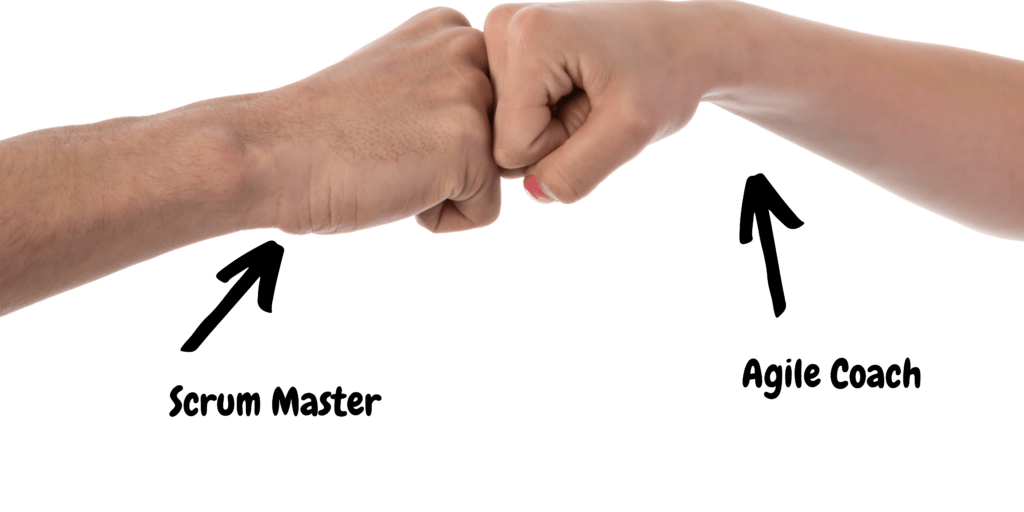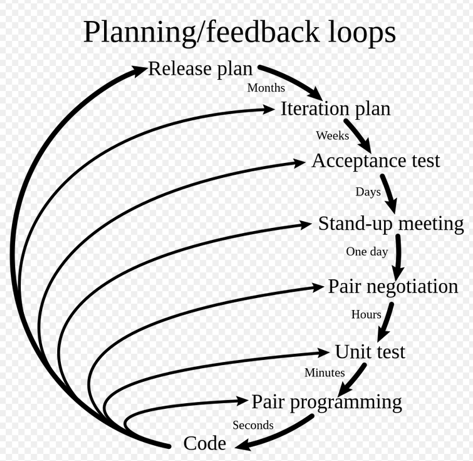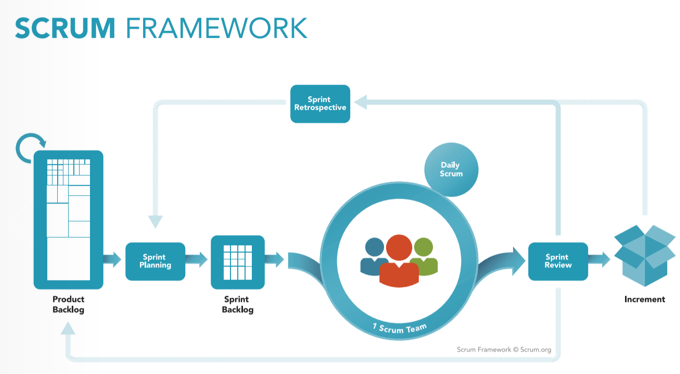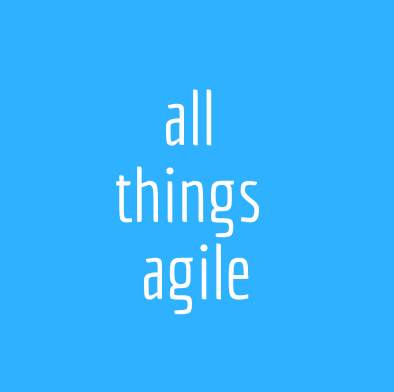
“What’s the difference between Agile Coach and Scrum Master?”
I get asked this question quite often and that’s when I realized how not obvious the distinction is. Having been a Scrum Master myself and eventually transitioned to Agile Coaching, I guess I see crystal clear the delineation mostly because of my experience in the flesh, which is not something everybody will necessarily experience.
I’ll do my best to illustrate what’s the difference between Agile Coach and Scrum Master roles.
I myself discovered Agile coaching in 2013, when I was an average Scrum Master, dissatisfied with my abilities to communicate and even with my personal resistance to change in many ways. The times are different now and the role of Scrum Master has changed, as has Scrum. Agile Coaches are now common in organizations of all levels and the role itself has changed as well.
In this post we’ll look into both the similarities and difference between Agile Coache and Scrum Master roles. Let’s start with the similarities.
The similarities between Agile Coach and Scrum Master
That’s probably what causes most of the confusion: when you look in the surface. There’s a lot of similarities between these roles, at least in their overarching impact.
Agile Coaches and Scrum Masters work with:
- teams: starting up teams, teaching teams, facilitating team meetings, facilitating team growth and improvement.
- stakeholders, helping them understand agility: how work is prioritized, broken down, the importance of feedback loops and what do these loops look like.
- individuals. As one team member or anyone in the organization is curious or resistant of any aspect of agility, the Agile Coach and the Scrum Master can help that person gain deeper understanding.
Agile Coaches and Scrum Masters lead by example. The behaviors, the ways of thinking need to be modeled for other to understand and pick up. It’s easy to tell others how to do things. It’s much more difficult to show things in action. A Scrum Master or Agile Coach that asks people to prioritize their work but gets all swamped on their own work do not inspire much trust. An Agile Coach or Scrum Master that does not appreciate collaborating and co-creating are going to face resistance.
And there is where the similarities end.
The difference between Agile Coach and Scrum Master
Even though they work with teams and individuals and stakeholders, those interactions in the detail are different. There are also some differences in the history and applicability of the knowledge of each.
What is a Scrum Master and what do they do?
So let’s look into Scrum Masters first.
What do Scrum Masters do?
Scrum Masters live in Scrum
Scrum Masters borrow their names from the framework they enact: Scrum. That’s where it was born. Today we see this role present in other frameworks based in Scrum such as Nexus, SAFe and LeSS.
That’s the first and most important distinction: a Scrum Master masters Scrum. There is more to Agile than Scrum, but in Scrum this role started as the keeper of the team process. And the Scrum guide back to 20 years ago had over 60 pages to describe the process, the techniques. There were very specific ways on how to do planning and guidelines on how to interact. It was the beginning of Agile for most software teams. A clear guidance was needed.
As you can imagine, mastering and teaching Scrum to the team(s) and the whole organization was in the menu. And still is. It’s just that Scrum got way simpler over time an anyone can decipher the now 13-page Scrum guide.
Even as they support stakeholders and individuals in the management team, Scrum Masters seek to advance the agility in the organization by way of Scrum as their framework of choice. It even says so in the Scrum Guide.
Scrum Masters are embedded in their teams
Scrum Masters are embedded in the Scrum team. They are part of the team. They partner with the Product Owner to support team effectiveness. Product Owners ensuring value delivery and Scrum Masters caring for team dynamics, clearing obstacles, and traditionally shielding the team from external interference.
When teams are new, Scrum Masters facilitate the Scrum events with the team members. As the team gains maturity and the Scrum Master might be deployed in more than one team, it’s possible the team facilitate their own Scrum events over time. In that case, the Scrum Master ensures that they happen and that they are effective.
Scrum Masters don’t need to know more than Scrum
While Scrum Masters can know agility beyond Scrum they don’t have to, as it’s not a prerogative of the role or the framework. XP, Kanban can be used by Scrum Masters, but no Scrum Master that ignores this knowledge is at fault. They can also know Six-Sigma, Lean Startup and any other methodology even beyond the realm of Agile, so long they are passionate about it and deem it productive. Still, none of this is required by the Scrum framework.
What is an Agile Coach and what do they do?
Now let’s look into Agile Coaches.
What do they do? What is different?
Agile Coaching is a framework-neutral set of skills and stances
Lyssa Adkins first started with the Agile Coaching framework in 2011 and since then it has made public and clear the necessary skills and stances an Agile Coach adopts. These stances are like hats, to be used in different interventions by the coach.
The framework is in public domain and taken care by a community of practitioners that codified the framework via Creative Commons license.
And the role continues to evolve, with the Agile Coaching Growth wheel , designed by the open-source community of coaches, chiefly Agile Alliance. One of the importance of this unified view is that clarity remains on what are the sets of skills to be expected from coaches, even though the role definition expanded.
Not to mention, unlike Scrum Masters, Agile Coaches follow agile values and principles, remaining framework neutral. That is to say, they do not strive to advance any specific framework within the organization. They are ready to support Scrum, XP, Kanban and any personalized flavor of Agility the organization seeks to develop.
Agile Coaches are Agile Practitioners
Agile Coaches per definition are required to have lived and experienced Agile in the trenches. They are agile practitioners first, and coaches (and facilitators, and teachers…) second. It is a requirement so that you can comprehend the theory in practice and to have empathy and understanding for what it takes on a human level to do the necessary mindset shifts to work in Agile.
You will not find anywhere a course to become an Agile Coach if you cannot prove your agile knowledge as a practitioner first. You can, however, do a course to become a Scrum Master while never having worked in Agile ways your entire life.
Agile Coaches are not embedded in teams
Agile Coaches do not live in teams. They can work in a very high touch with Agile teams for a while, sometimes when they start those teams or when a particular group asks for support to get over some dissonances. Yet the Agile Coach is not expected to stay and grow with the team like any sort of a team lead or Scrum Master or manager would along the years.
And in fact, many times Agile Coaches will work with individuals on their particular evolution through agile and sometimes work with groups that are not necessarily teams, but whole departments, who might want to make agile changes to their processes.
Agile Coaches don’t need to know Scrum
Agile Coaches can have a long career without ever touching Scrum. While Scrum is rather popular as a framework and I believe most coaches know it, Agile is a vast universe and the experience in any flavor of Agility is welcome, because Agile Coaches will abstract the learnings and concepts.
Retrospectives, feedback loops, synchronization, experimentation, iterations, small batches. All of that belongs to the bigger pile of agility and it will look different in Scrum, Kanban or XP. Yet their meaning and significance is what the Agile Coach will derive to help individuals and teams understand Agile.
Here’s an example on how iterations (same concept) differ in XP versus Scrum.


Agile Coaches are coaches and facilitators
Agile Coaches are expected to be able to carry all sorts of work sessions, conversations, and meetings to a productive end. They must know how to increase collaboration and alignment in a group of 2 or 200 people, how to create safe spaces and how generate mutual understanding.
They are also expected to understand and apply coaching in their practice, which is a stance of deep partnership between parties to unlock that partner (a person, a team, a whole organization) true potential.
That is why more than desirable it is expected that agile coaches are skilled in facilitation and in professional coaching.
Can Scrum Masters do more?
The Scrum guide lists many attributions to a Scrum Master.
And I am of the opinion that every Scrum Master must develop many of the agile coaching skills to be helpful to their teams and organizations. This becomes clear when you have one-on ones with team members or when you want to invite your team to consider what is high performance.
I don’t speak of that because I am an Agile Coach. I speak of that because I WAS a Scrum Master struggling, force-feeding Scrum to my teams and my organization getting frustrated at them for wanting to operate differently.
I was closed to other aspects of agility, and I was unskilled in human, future-ready skills. I believe no Scrum Master will go far if all they know is Scrum and if they are not emotionally intelligent and if they don’t invest in the so-called soft skills. Scrum is but a piece of the puzzle. Surprisingly, it’s the easiest one.
I became an Agile Coach because of that hardship where frameworks are not difficult, yet people and their expectations and their emotions is at the heart of resistance or empowerment. So that’s why there are differences between Agile Coach and Scrum Master roles I believe they should operate in similar levels as far as human skills. For that, stay tuned to another post in which I will explain in more details why I believe every Scrum Master should invest in growing their agile coaching skills.
Also, I’ll be very explicit on this one: Scrum Masters and Agile Coaches are partners whenever they both coexist in organizations. They have complementary functions and different attributions.
As for now, I hope the difference is somewhat clear. Let me know what you think and what you are living these days.



